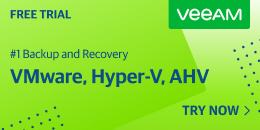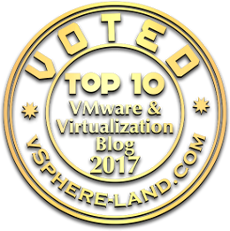From it’s initial launch VMware Cloud Foundation (VCF) has been an all VMware software-defined stack powered by vSAN for both the management and workload storage domains. Customers that wanted to add additional storage were limited to only using vSAN as the solution didn’t allow for support of external storage devices to be used with VCF. That changed when VMware introduced version 3.5 of VCF late last year, with 3.5 supported storage was extended to include external NFS storage devices but only for workload domain storage. VMware described this new support in a blog post:
[important]”VCF now supports creation of a Workload Domain on NFS 3.0 Storage. Although VSAN is the preferred storage platform for VMware and Cloud Foundation, we recognize that many customers have existing investments in NFS 3.0 storage that they would like to continue to leverage. With NFS support customers can continue utilizing their investments in NFS as they begin their Cloud Foundation journey.”[/important]
A look at the VCF 3.5 FAQ document also confirms support and specifically states the following in the storage section:
- Q. Is vSAN required with Cloud Foundation? A. vSAN is the required primary storage for the management domain.You can deploy VI workload domains without vSAN and use external NFS storage instead.
- Q. Can I use Network Attached Storage (NAS) with Cloud Foundation? A. Yes, you can create VI workload domains with external NFS storage. iSCSI storage can be connected manually.
- Q. Can I use FCoE or Fibre Channel with Cloud Foundation? A. No, FCoE and Fibre Channel are not supported with Cloud Foundation.
The FAQ states that both NFS & iSCSI storage are supported with VCF in 3.5, the difference between the support of those protocols is that NFS storage supports automatic provisioning of storage as opposed to iSCSI storage which must be manually provisioned. The reason for that is NFS storage can be managed within the SDDC Manager interface and iSCSI cannot presumably because it can’t deal with LUN management. Support for Fibre Channel storage is specifically called out as not support presumably as it is not network based storage and you have additional configuration overhead with zoning.
As of recently VMware now officially supports using FC storage with VCF as well with the caveat that no automation is supported like it is with NFS storage and it must be manually provisioned and managed out of band. FC is supported starting with the VCF 3.5.1 release, which also includes version 3.7 which was just released. As far as I know VMware has not made any announcement around this new support, I found out through meetings with the VCF product manager at VMware who said it was OK for partners to make announcements about it. Again support for FC storage is limited to the workload domain as only vSAN can be used for the management domain storage.
You’ll notice that there is no special HCG listing for supported storage with VCF, basically any storage that works with vSphere is supported although it is up to each partner to do some basic validation that their storage platforms work OK with VCF. With NFS storage it can be managed automatically in band as demonstrated in this demo video. With block storage (FC/iSCSI) it must be managed manually and out of band. VMware does look to extend automation to block storage as well at some point by leveraging Virtual Volumes (VVols) which automates storage provisioning at the VM level through policy based management and eliminates the need for LUN management.
It’s good to see VMware extending their VCF stack to support external storage which benefits both customers and partners and allows more flexibility when deploying VCF. It’s also good to see another use case for VVols as it shares the same policy based management framework with vSAN and they are fully interoperable with each other. You can learn more about VMware Cloud Foundation on the VMware website and I suspect at some point VMware will publish acknowledge of the new FC support somewhere.




1 comment
Thank you very much for your informative article